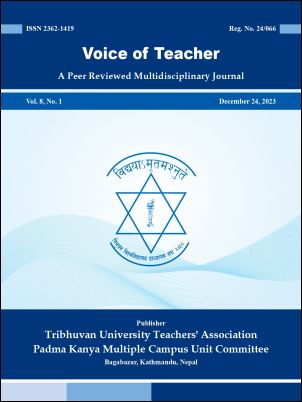Status of Sanitation Workers: A Case Study of Kathmandu Valley
DOI:
https://doi.org/10.3126/vot.v8i1.60823Keywords:
sanitation workers, livelihood, vulnerableAbstract
Sanitation refers to the provision of services for the safe disposal of urine and feces. It also refers to the maintenance of hygienic conditions through different services such as garbage collection and waste water disposal. It is necessary to provide a healthy environment for people as well as protect the natural resources. A sanitation worker is a person which responsible for cleaning and maintaining the environment through sanitation services. This study aims to explore the socio-economic status of sanitation workers and to examine their livelihood means that help their living. For this study, both quantitative and qualitative exploration approaches are applied. The observation, interview as well as case studies are applied to the study. The findings of the study concluded that sanitation occupation is a traditional job for employment and reducing poverty in the civic area but sanitation workers also have to face numerous problems and they’ve different pitfalls which are nominated as the vulnerable environment of sanitation workers. This study helps the government and non-government agencies to make programs and mitigation measures.




